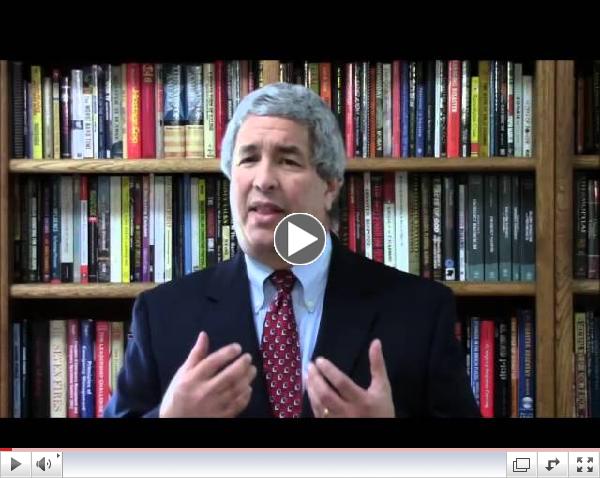|
Exploring Emergency Management & Homeland Security
|

A New Vision for ICS Training
by Timothy (Tim) Riecker
Yep, I'm still at it. It seems with every post about the condition of Incident Command System training as we know it, I'm able to draw more people into our cause (aka the Crusade). While I've never espoused there to be an easy solution, the training that we currently provide for ICS falls well short of doing us any favors. People walk out of each subsequent training course with a marginally increased understanding of the system and how to use it. And that's really the fundamental problem, isn't it?
Perhaps at some point, someone had the idea of developing ICS 100-400 to be knowledge-based courses, with position-specific training to be more about application. Unfortunately, that's a significant disservice to responders and the populations they serve, which was further exacerbated by the NIMS training requirements, creating a type of a false sense of security in which people believed that they have 'been trained in ICS', therefore all is well in the world. Responders, in the broadest sense, at supervisory levels within every community should be trained not only in what ICS is but also how to implement it. Not every community, for a variety of reasons, has reasonable access to position-specific training, so the core ICS curriculum absolutely MUST do a better job in teaching them how to implement the system.
This also goes further than just training. ICS, like so many other things, is a knowledgebase that tends to degrade over time. Without practice, you tend to lose the skills. This is how people who are on Incident Management Teams or those who work regularly in an ICS-based Emergency Operations Center are so well practiced in the system. In the absence (hopefully!) of actual incidents, planned events and exercises go a long way to keeping skills sharp. Even those, however, can get costly and time-consuming to design and conduct. Enter the hybridization of scenario-based training, which is something I've written on in the past. Not only do we need to include more scenario-based training in everything, we need to include a scenario-based ICS skills refresher course as part of the core ICS curriculum.
While I continue to have various thoughts on what there is to be done with the ICS curriculum as a whole, here is my current vision...
ICS-100: (What is ICS?) Pretty much keep this as is, with options for on-line and classroom delivery. The purpose of this course is to serve as an introduction to ICS concepts for those who are likely to come into contact with it and work in lower levels within the system. This is levels one (knowledge) and two (comprehension) of Bloom's taxonomy. It shall serve as a prerequisite to further ICS classes as it provides much of the fundamental terminology.
ICS-200: (How do I work within the system?) Tear down/burn down/nuke the on-line version and never look back. Simply making it 'more accessible' doesn't mean that it's good (it's not). The purpose of this course is to expand on knowledge and begin to approach functionality. I expect content to reach deeper than what is currently within the course.
___________________________________________
____________________________________________
Tim Reicker is a founding member, partner and principal consultant with Emergency Preparedness Solutions, LLC, a private consulting firm serving government, businesses, and not for profit organizations in various aspects of emergency and disaster preparedness.
|
|
Bernstein Crisis Management
|
 Crisis Management Case Study: Exploding Fireplace Recall Crisis Management Case Study: Exploding Fireplace Recall
by Erik Bernstein
Reporters and media of all kinds are inevitable sources of stress for many crisis management situations, but that doesn't mean it's healthier to shut them out. With the modern 24/7 news cycle and literally millions of places for information to be shared even small issues often mean contacts from media outlets today.
The Crisis
Home Products manufacturing (name disguised), based in the Midwest with operations throughout North America, received reports from distributor showrooms that some of the gas fireplaces it marketed were blowing up when used, sending glass flying. Two distributor employees had been injured to date, but no known consumers.
While the CPSC was in the process of formally demanding a Class I recall, Home Products reached out to Bernstein Crisis Management for assistance with all relevant internal and external communications.
The Response
The Bernstein Crisis Management team quickly learned that one of the challenges of this recall was that the product involved could only be tracked as far as the first-level buyer, typically a distributor such as one of the large hardware chains or major home builders. Tracking thereafter was at the whim of whatever record keeping was done by the first-level buyer.
This meant that widespread public communication was particularly important to alerting consumers ASAP.
The Bernstein team recommended specific strategies and messaging, which it helped draft. Realizing the CPSC announcements were (a) very dry and (b) only gave facts, never considered the feelings of those impacted (a critical consideration in crisis communications), a CPSC-compliant press release was created factoring in compassionate messaging, and distributed as far as possible using relevant wire services and online publication opportunities.
End result: No further injuries. Product mostly recalled. No hit to company's reputation in terms of lost customers.
______________________________________________
Erik Bernstein is Vice President of Bernstein Crisis Management, a specialized firm dedicated to providing holistic strategies for managing crisis situations.
|
|
|
| PrepTalks: Amanda Ripley "The Unthinkable: Lessons from Survivors" |
This short PrepTalk features journalist Amanda Ripley talking about the importance of information sharing and transparency in helping to save lives in a disaster. I've heard her speak many times and it's always worth listening to her. Her book, The Unthinkable: Who Survives When Disaster Strikes - and Why, is one of the books I consider required reading for emergency managers. |
The following are excerpts from my blog
Canton on Emergency Management. Please visit my blog to see the rest of my articles.
Killing the messenger supposedly went out of fashion years ago, yet in our stupidity we still attack the powerless representatives of major companies.
|

M
y Blogs
Follow Me
|
|

Welcome to the September edition of edition of Emergency Management Solutions.
Is your ICS training effective? Tim Riecker offers some pertinent suggestions on how we can improve our current course offerings.
Erik Bernstein offers a simple case study on the importance of getting the tone of your public messages right. My own contribution is an updated article on reputational damage that ties in with this month's suggested reading on strategic crisis management,
Regards,
|
|
_
________________________________________________
Reputational Damage
_________________________________________________
In assessing the impact of potential hazards on an organization, it's not uncommon to focus on tangible impacts, such as potential damage, possible injury, or estimated downtime. However, many crises generate intangible impacts as well. The Northridge earthquake, for example, resulted in a demographic shift that changed both the composition of the labor pool and the types of businesses within the community.
The most neglected of these intangible impacts is the potential effect on the organization's reputation. This is surprising as we see daily examples of how events can have an immediate impact on reputation. What is also interesting to note is that in many cases the damage is caused not by the event itself but by the real or perceived mishandling of the crisis.
Economic Loss
A classic case in point is the mishandling of a crisis by Perrier in 1990 when reports began to surface of benzene in its bottled water in North America. Perrier reacted well by immediately recalling some 70 million bottles of water. It then announced that the problem was caused by improper cleaning of a production line machine and was limited to North America.
______________________________
_______________________
________
If you are having trouble viewing my featured article, try clicking on the link at the top of the page. You can always find my articles in the white paper section of my blog site, Canton on Emergency Management.
|
|
Resources
Does Climate Change Influence Post-disaster Relocation?
Emergency managers are used to rapid deployments in response to disasters. But do you the know the same is true of academic researchers? Disasters present an opportunity for advancing our knowledge of how people and institutions respond to crisis. An excellent example of this is a Quick Response Report published in the most recent
newsletter from the Natural Hazards Center. The report, titled
Relocation, Repopulation, and Rising Seas by Omur Damla Kuru, examines the impact of Hurricane Irma on Monroe County, Florida, and the influence of climate change on residents' decision to relocate following the event. It's a complex question involving economic impact and demographics and well worth the read.
|
FEMA Seeks Stakeholder Feedback on Trio of Guidance Documents
The Federal Emergency Management Agency has released
three documents
for national engagement. The documents are the "NIMS Implementation Fact Sheet for Private Sector Organizations," the "Operational Period Shift Briefing Template" and "SAMHSA's Stress Management."
FEMA will sponsor a 30-day National Engagement Period during which the agency will solicit feedback from its stakeholders. Comments received during this period will be reviewed, adjudicated and, as appropriate, incorporated.
This national engagement period will conclude at
5 p.m. EDT on Oct. 24, 2019
.
To view the three draft document and feedback forms, please visit
|
___________________________________
Professional Development Opportunities
Nov. 15-20, 2019
Savannah, Georgia
The goal of the IAEM Annual Conference is to improve knowledge, competency level and collaborative skills. IAEM accomplishes this by attracting relevant high-profile speakers to address current topics and practical solutions.
|
|
 The Politics of Crisis Management: Public Leadership Under Pressure The Politics of Crisis Management: Public Leadership Under Pressure
By Arjen Boin, Paul't Hart, & Bengt Sundelius
One of the intriguing paradoxes of emergency management is that those most likely to encounter a crisis are those least prepared for one. No where is this more evident than watching public officials react to crisis.
In this fascinating book, the authors look at strategic crisis management and examine the role of public leaders. This is not easy going and many may claim that it is above our pay grade as emergency managers but if we are to fulfill our role as trusted advisers, we should at least be conversant with strategic crisis management. In addition, the five critical tasks of strategic crisis leadership identified by the authors have a very real application to emergency management operations.
The book is not easy going but it is extremely interesting and makes good use of case studies and examples, many related to political crises rather than natural disasters. This in turn helps increase our understanding of the political dimensions of a crisis, something we tend to forget.

______________________________________
|
Emergency Management: Concepts and Strategies for Effective Programs
Second Edition
AVAILABLE NOW!
|
|
Need a speaker for your next conference? I offer keynotes, seminars and workshops.
 |
|
Three Reasons Why I'm the Right Speaker for Your Conference
|
|
|
Speaking Engagements
Learning From The Past: What We Remember, What We Forget
November 19, 2019
Savannah, GA
|
|
| |
|